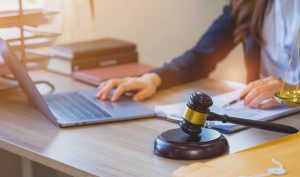By Cat Mulligan. Last Updated 19th March 2024. If you have had an accident in a public place you may have heard about or been advised to file a report in an accident book in a public place. But, what are accident books in public places, what should be recorded in an accident book, how is this used and are they helpful in making a personal injury claim? In this guide, you can find the answers to these and other questions.
If you have been injured in a public place you may find that in the immediate aftermath you are quickly rushed off to a doctors surgery or hospital as appropriate and so unable to report the accident to the relevant authorities.
At this point, you will more likely be focusing on getting whatever healthcare you need and could even question why should accidents be reported at all? But making sure that the details of your accident (what the cause was and how you have been injured) are correctly reported or recorded can be invaluable.
The consequences of not reporting an accident at work, in a shop or in the street could be that if you later choose to make a personal injury claim you have less evidence of the accident having taken place.
As soon as you are able to do so, we recommend that you report the circumstances of your accident to the relevant authorities and recorded in an accident report log or book.
To find out more about how and why you should report being injured in a public place please read on. If you would like to speak to an advisor about potential work accident claims, you can contact Public Interest Lawyers today by calling 0800 408 7825.
You can also reach us online using our contact page or live chat service.
Choose A Section
- When Is An Organisation Legally Required To Have An Accident Book?
- What Type Of Accident Or Injury Should Be Recorded In An Accident Book In Public Places?
- Personal Injury Calculator For Accidents Which Have Happened In A Public Place
- Can I Make A No Win No Fee Claim After Reporting An Accident?
- Learn More About Recording Entries In An Accident Book In Public Places
When Is An Organisation Legally Required To Have An Accident Book?
So, when is an organisation legally required to have an accident book?
If a company has ten or more employees or if the company owns or occupies a mine, factory or a quarry, there is a legal requirement to have an accident book in public places. This requirement is set out in the Social Security (Claims and Payments) Regulations 1979.
However, even if an employer does not meet these criteria, or if they are a public place which does not have a requirement under this act to retain and record information, they must still make sure to record and report any incidents which fall under the RIDDOR as looked at above. A full list of reportable incidents can be found on the HSE website.
What Type Of Accident Or Injury Should Be Recorded In An Accident Book In Public Places?
Next, we shall look at different types of accident which have to be reported and recorded. Some accidents do need to be reported and others do not. Which incidents need to be reported are set out in the 1995 Reporting of Injuries, Diseases and Dangerous Occurrences Regulations. These include;
- Injuries that prevent an employee from being able to carry out their usual duties for three days or more.
- Those which are classified as a major injury such as a break to the leg, arm or ribs.
- Fatal accidents.
- Workplace diseases.
- Dangerous instances such as a structure of scaffolding collapse.
Whilst not all instances of an accident or a disease are legally required to be recorded under RIDDOR guidance, we do recommend that all accident at work examples and accidents at public places are recorded. Even reporting a minor accident could help to prevent a larger accident from taking place in the future.
How Much Can I Claim For An Accident In a Public Place?
Now that you know more about when an organisation is legally required to have an accident book, you might be wondering how much compensation you could be owed. If you make a successful personal injury claim after an accident in a public place, you could receive up to two heads of claim.
The first of these is general damages. This head of claim covers the pain, suffering, and loss of amenity you experience as a result of your injuries. Those who value compensation under this heading may reference the Judicial College Guidelines (JCG) for help, as this document provides guideline compensation brackets for a number of different injuries.
You can find some examples of these guidelines in the table below, but please note that the first entry has not been taken from the JCG.
Guideline Compensation Brackets
Injury Compensation Notes
Special Damages And Multiple Severe Injuries Up to £1,000,000+ Multiple severe injuries alongside financial losses like lost earnings and home adjustments.
Very Severe Brain Damage (a) £282,010 to £403,990 There is little to no language function, and little to no response to the surrounding environment.
Moderate Brain Damage (c) (i) £150,110 to £219,070 There is a moderate to severe intellectual deficit, an effect on the senses, and a risk of epilepsy.
Kidney Injuries (a) £169,400 to
£210,400
Loss of or serious damage to both kidneys.
Severe Back Injuries (a) £91,090 to £160,980 The most severe injuries fall into this bracket, including damage to the spinal cord and nerve roots.
Injuries To The Bowels (b) Up to
£150,110
A reliance on a colostomy bag due to a total loss of natural function.
Bladder Injuries (b) Up to
£140,660
Complete loss of natural function and control.
Wrist Injuries (a0 £47,620 to £59,860 Complete loss of function in the wrist.
Hernia (a) £14,900 to
£24,170
Limitations on movement, activity, employment and sport with pain continuing even after repair.
What Are Special Damages?
Special damages are the second head of compensation that you could receive. This heading addresses the financial losses caused by your injuries. For example, special damages could potentially cover the cost of:
- Lost earnings.
- Home adjustments.
- Mobility aids.
- Prescriptions.
- Travel costs.
- Childcare.
- Help with cooking or cleaning.
However, to claim compensation under this heading, you need to be able to prove your losses. Evidence that could help with proving your financial losses may include payslips, invoices and bank statements.
Contact our team of advisors today to learn more about compensation in personal injury claims, or read on to find out how a solicitor from our panel could help you.
Can I Make A No Win No Fee Claim After Reporting An Accident?
Now that you’ve learned more about how recording your accident in the accident book could help your claim, you might be interested in seeking legal representation. Our panel of solicitors offer their services on a No Win No Fee basis by offering their clients a Conditional Fee Agreement (CFA).
Under this agreement, you aren’t expected to pay any upfront or ongoing fees to your solicitor for their services. Likewise, if your claim fails, your solicitor won’t take payment for their work.
If your claim succeeds, then your solicitor will take a success fee. This is a small percentage taken from your compensation, which is limited by a legal cap. The legal cap helps to ensure that you keep the majority of what you receive.
If you recorded your accident at work in an accident book and want to know what to do next, talk to our advisors. They can evaluate your claim for free, answer any questions you may have about the claims process, and potentially connect you with a solicitor from our panel. To connect with them today, you can:
- Call 0800 408 7825
- Use our live chat.
- Contact us online.
Learn More About Recording Entries In An Accident Book In Public Places
If after reading our guide article looking at the role of an accident book in public places and personal injury claims, you still have questions or wish to find out more, you can see additional information in these resources from our site and the Health and Safety Executive.
- Public Accident Claims Hot Spots
In this article, we look at potential hot spots where accidents in a public place could happen, and what you could do if they do. - Swimming Pool Accident Claims
This guide covers everything you need to know about making a compensation claim for an accident at a swimming pool. - Who Should You Report An Accident To?
The RIDDOR is a way of documenting accidents and injuries with the Health and Safety Executive - Further Information On Accident Report Books
This article from the HSE looks more at accident report books and how to order them.


